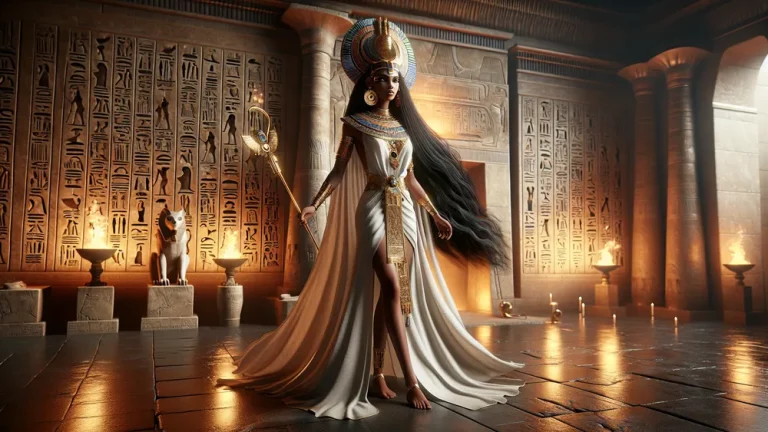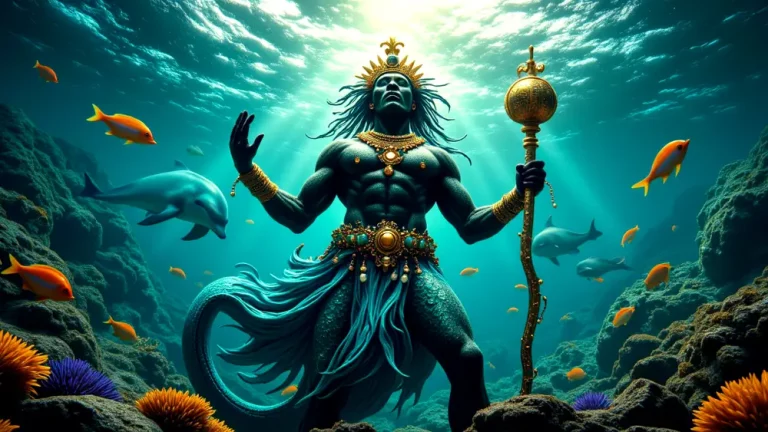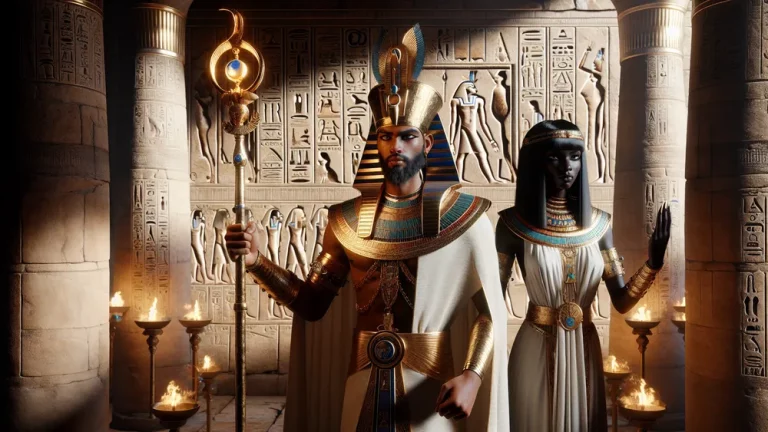Thetis: Greek Sea Goddess And Nereid Leader
Thetis, a Greek sea deity and head of the Nereids, is an interesting figure in Greek stories. Thetis, born to the sea god Nereus, shows the strength and beauty of the ocean. Besides her divine heritage, she holds a key role in directing the Argonauts and influencing the path of Achilles, a main hero of the Trojan War.
Key Points:
- Thetis is a Greek sea goddess and leader of the Nereids.
- She played a vital role in guiding the Argonauts and influencing Achilles in the Trojan War.
- Thetis had powers like changing form, controlling the sea, and caring for sea creatures.
- Her marriage to Peleus led to the birth of Achilles but brought her unhappiness.
- Thetis’ love for Achilles led her to try to make him invulnerable, but his heel remained his weak spot.
- Thetis asked Zeus to help the Trojans in the war until Achilles was respected, affecting the battle outcome.
Her story lets us look into Greek mythology, where gods and humans mix in a complex pattern of fate.
Thetis: Review and Key Facts
| Category | Description |
|---|---|
| Parents | Nereus and Doris |
| Siblings | 49 Nereid sisters |
| Job | Sea deity, leader of the Nereids, and mother of Achilles |
| Loved by | Zeus and Poseidon |
| Marriage | Married to Peleus, king of the Myrmidons of Thessaly |
| Children | Achilles and maybe six other kids who died |
| Abilities | Changing shape, control over the sea, and taking care of fish and other sea creatures |
| Honored | Celebrated in Laconia, with a special place at Sparta |
| Importance | She had a vital part in helping the Argonauts and affecting what happened to Achilles |
Thetis as a Nereid Leader
When we look more into Thetis’ importance in Greek myths, her job as the head of the Nereids becomes more and more important. This leading role not only shows her divine family background, but also her control over the sea and its living things.
Role as Nereid Leader
When we look more into Thetis’ job as the leader of the Nereids, her part in Greek stories is very important. Her job not only showed her divine family but also showed her control over the sea and its animals. How Thetis led was marked by her care and kindness, as seen when she saved Hephaestus. He was thrown off Mount Olympus by his mother, Hera, because he was weak and sickly.
Thetis and the Nereids looked after him well, and he stayed with them for years. He learned his metalworking skills and made things for the Nereids to thank them for their help. During her time together with her many sisters, she worked as a group. They helped important figures like Jason and the Argonauts, by steering their ship safely near the dangerous sea monsters Charybdis and Scylla and the big, moving Wandering Rocks.
Thetis‘ part in helping the Argonauts shows her importance in Greek stories. She helped them sail through rough waters, avoiding deadly sea creatures. Her leadership and help were crucial to their mission.
Key Aspects of Thetis’ Leadership:
- Kind and Caring: Thetis showed great care and kindness to Hephaestus, accepting him and helping him learn his metalworking skills.
- Unified with Sisters: Thetis worked closely with her sisters to help significant Greek figures, like Jason and the Argonauts.
- Control over the Sea: Thetis’ job showed her control over the sea and its creatures, making her a powerful figure in Greek stories.
Thetis’ leadership and aid to the Argonauts were vital in helping them safely maneuver through treacherous waters, avoiding dangerous sea creatures.
Thetis and the Sea
Thetis, as a sea goddess and head of the Nereids, had a deep connection to the sea. Her job wasn’t just about her connection to the sea. She also actively protected sea life and affected the ocean’s moods too. This came from her divine family background. She was the daughter of Nereus, the old man of the sea. Often felt, Thetis’ presence helped sailors travel safely through dangerous waters.
Her powers over the sea went beyond guiding ships though. She also played a vital part in keeping the sea life systems balanced.

Comparison of Sea-Related Powers:
| Deity | Powers |
|---|---|
| Thetis | Control over the sea, protection of marine life, shape-shifting |
| Poseidon | Control over earthquakes, storms, and the tides |
| Amphitrite | Power to still the winds and calm the sea |
| Triton | Ability to control the sea and its creatures |
Note: The powers listed are not everything, just some of the notable abilities each deity had.
Thetis and Peleus
When we look more into Thetis’ importance in Greek stories, her marriage to Peleus, king of the Myrmidons of Thessaly, becomes a key part of her story. This marriage, full of both love and problems, also affected the life of their son Achilles and had wide-reaching effects in the world of Greek stories.
The Unhappy Marriage
Thetis, the sea goddess, was not willing to marry Peleus, a mortal king. In fact, she tried to escape him by changing into various forms, including a lioness, a serpent, and even fire. Driven by determination, Peleus held on and eventually caught her.

This unwilling marriage was arranged by Zeus, who feared that Thetis’ son would surpass him, just as he had surpassed his own father. By marrying a mortal, Thetis’ son would be mortal too, which would eliminate the threat to Zeus’ power. What happened after this marriage was big. Thetis had Achilles, a demigod who would become a legendary hero in the Trojan War. However, Thetis was unhappy in her marriage.
She felt trapped and limited by her mortal husband. This unhappiness had a big effect on her relationship with Achilles and her part in the events that followed.
Consequences of Thetis’ Marriage to Peleus:
- Birth of Achilles: Thetis had Achilles, a demigod who would become a legendary hero in the Trojan War.
- Thetis’ Unhappiness: Thetis was unhappy in her marriage and felt trapped and limited by her mortal husband.
- Impact on Achilles: Thetis’ unhappiness had a big effect on her relationship with Achilles and her part in the events that followed.
Thetis’ Love for Achilles
Thetis, the sea goddess, had a strong love for her son Achilles, which made her want to make him unstoppable. Myth says Thetis dipped Achilles in the River Styx as a baby. She held him by the heel, which stayed unprotected. This act was supposed to make Achilles invulnerable, but it became his weak spot. Thetis’ love for Achilles was so strong that she did a lot to protect him, even if it was hard.

The meaning of Achilles’ heel is that it shows even great heroes can have weaknesses. This weakness would lead to Achilles’ death. Paris‘ arrow hit him in the heel, ending his life.
Thetis in the Trojan War
When we look at Thetis’ role in the Trojan War, we see how her effect went beyond who she was close to, shaping the course of the fight. Her dealing with Zeus and her son Achilles had big results for the war’s outcome.
Thetis and Zeus
Thetis, the sea goddess, played an important role in the Trojan War through the ways she interacted with Zeus. Myth says Thetis asked Zeus to help the Trojans win until Agamemnon showed respect to Achilles again. Zeus agreed to this request and was on the Trojan side for some time, which made the Greeks suffer.
Thetis’ influence over Zeus came from her past actions, as she had once saved him from being overthrown by the other gods and was meant to have a son greater than his father.

Key Events Involving Thetis and Zeus:
- Thetis’ Ask for Zeus’ Help: Thetis asked Zeus to let the Trojans win until Agamemnon showed respect to Achilles again.
- Zeus Being on the Trojan Side: Zeus sided with the Trojans, and this made the Greeks suffer.
- Thetis’ Past Influence Over Zeus: Thetis saved Zeus from being overthrown by the other gods and was meant to have a son greater than his father, which gave her leverage over Zeus.
Thetis’ Acceptance of Fate
Thetis, the sea goddess, finally accepted the fate of her son Achilles, a demigod who was meant for both greatness and tragedy. Though she first tried to make him unstoppable, Thetis understood that she could not change what was going to happen. When Thetis accepted what would happen to Achilles, it showed that even gods are powerless against destiny.
Thetis’ actions, which were driven by love and a wish to protect her son, in the end, show that fate cannot be escaped. This idea is central to the myth, showing the limits of power among gods and the certainty of fate.

Thetis’ acceptance of Achilles’ fate demonstrates that even gods are unable to alter destiny, emphasizing the inevitability of fate in the myth.
The Pantheon of Greek Gods
The world of Greek gods is big and interesting, and it includes many deities with different roles and personalities. For a complete look at the Greek gods, check out the list of all the Greek gods. This big resource studies the stories, symbols, and mysteries of each god and goddess, giving a lot of knowledge about the Greek mythological landscape.
FAQs
1. What is Thetis’ role in Greek mythology?
Thetis’ role in Greek mythology is that of a sea goddess and leader of the Nereids, known for her involvement in various stories, including guiding the Argonauts and her relationship with Peleus and Achilles.
2. What is the significance of Thetis’ marriage to Peleus?
Thetis’ marriage to Peleus resulted in the birth of Achilles and highlighted her unhappy relationship with her husband.
3. How does Thetis contribute to the Trojan War?
Thetis contributes to the Trojan War by pleading with Zeus to intervene on her son Achilles’ behalf and by providing him with new armor made by Hephaestus.
4. What is the symbolism of Thetis’ actions in the Trojan War?
The symbolism of Thetis’ actions in the Trojan War represents the powerlessness of even the gods against fate and the importance of accepting one’s destiny.







